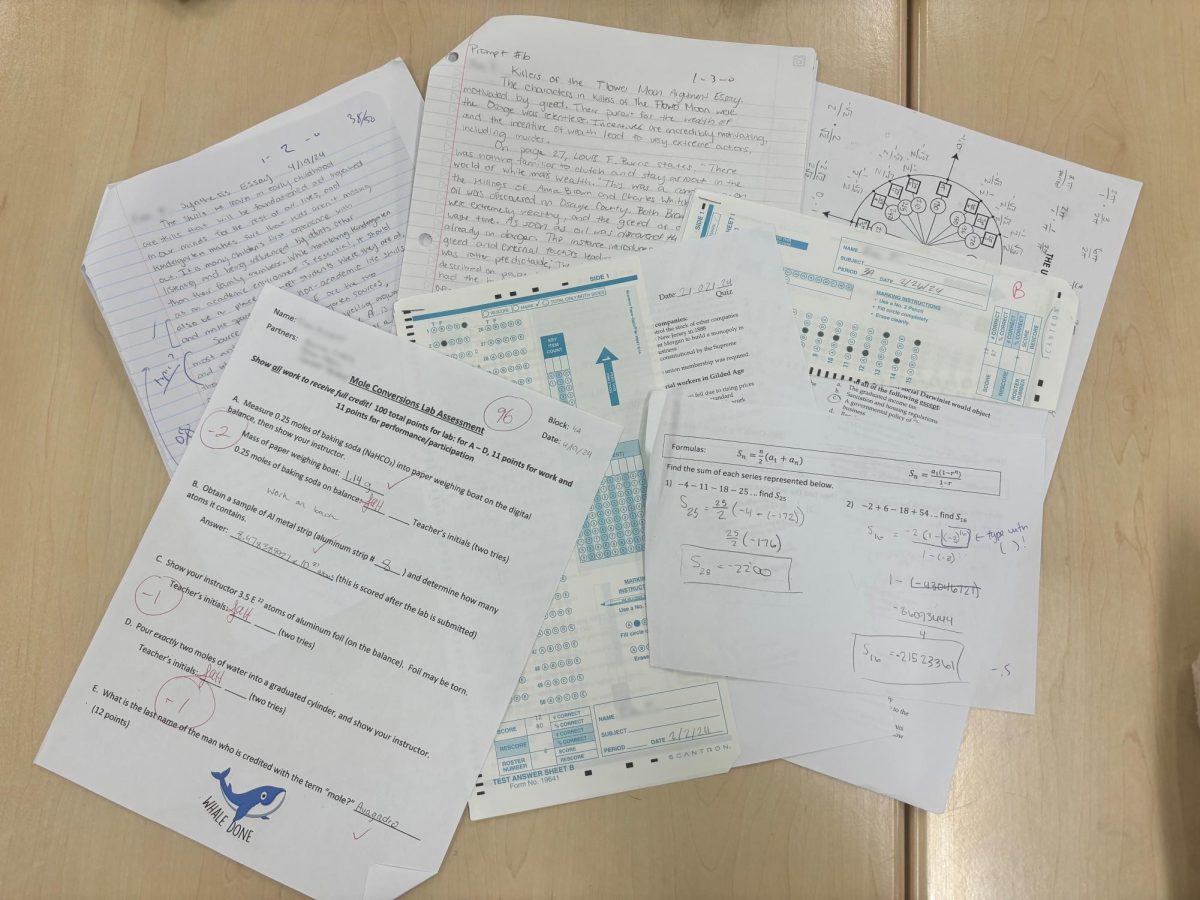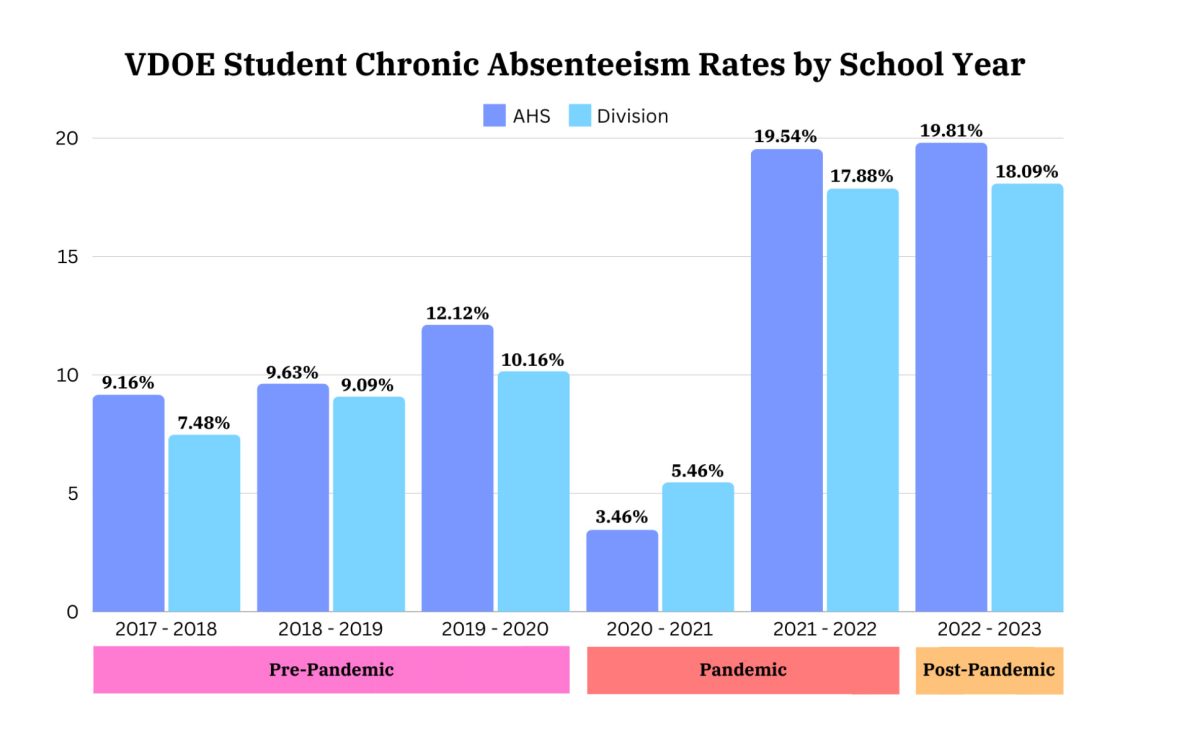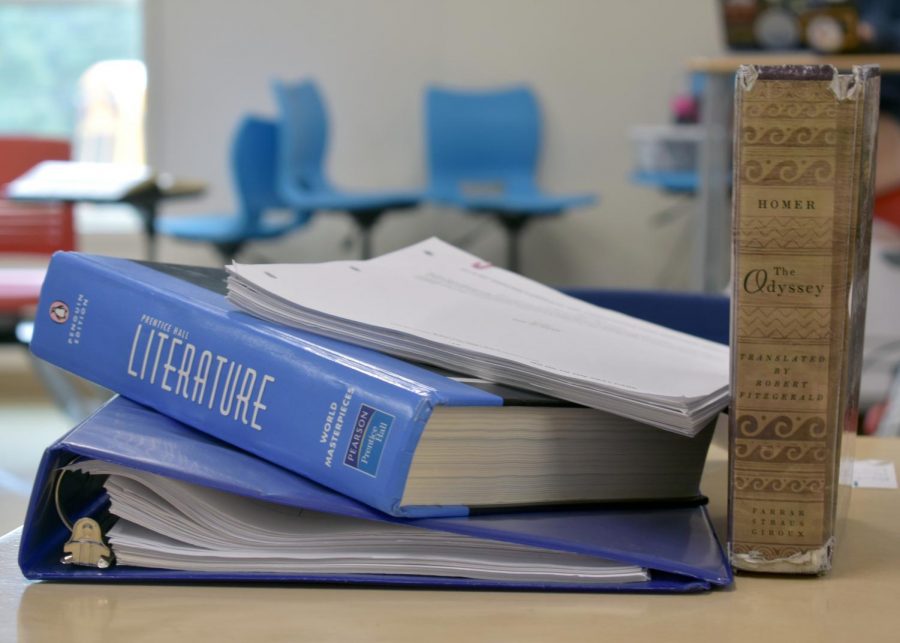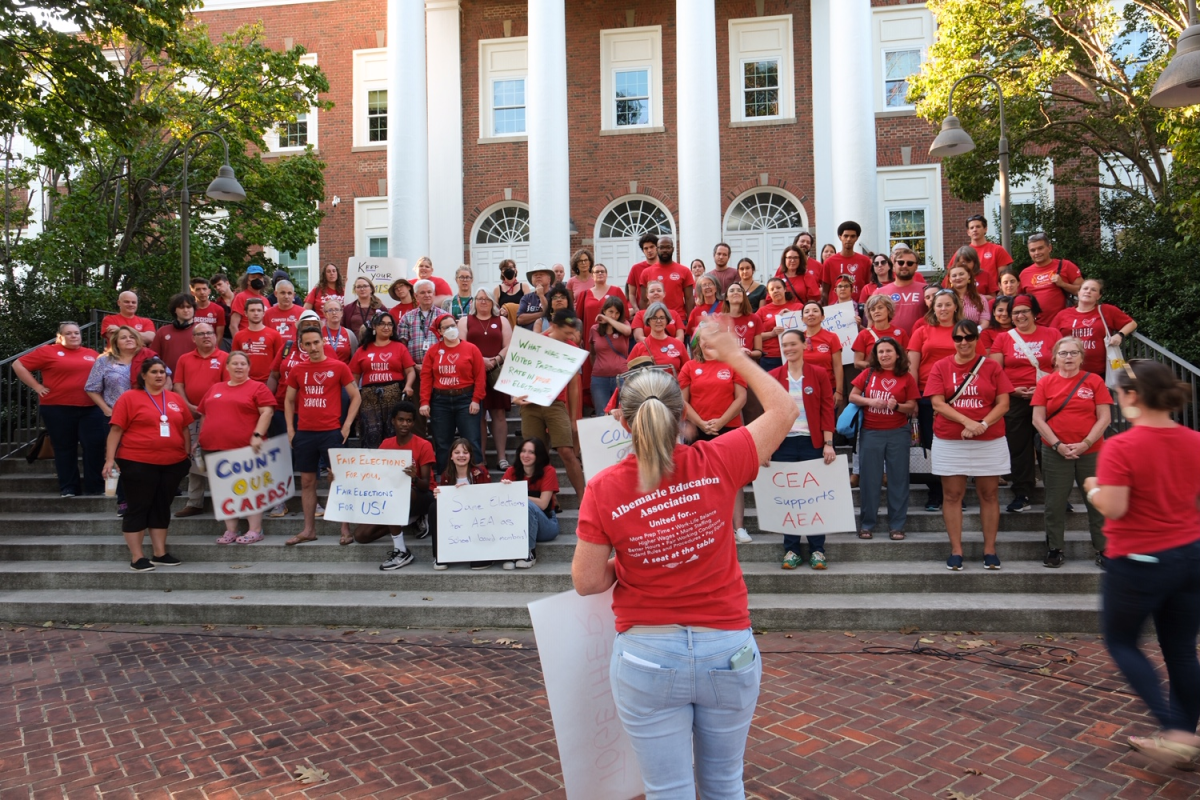Students and teachers alike are frustrated with the state of our school, and with the grading policy in particular.
46% of ACPS 6-12th grade students reported that their teachers did not have rigorous expectations in the Spring 2024 Panorama survey. This puts ACPS in the tenth percentile nationally.
Senior Shea Hale feels so strongly about the negative impact and uncertainty of the grading policy that she spoke in front of the school board at their Nov. 9 meeting.
“The mindset you’re fostering for students is the idea that anything we do is simply unimportant because we will always get a possibly undeserved second chance,” Hale said to the school board. “Students do not take it upon themselves to truly prepare and learn the material given to us, leaving so many with a lack of important skills and traits—a lack of study skills, a lack of initiative, and a lack of self-discipline.”
48% of 6-12th grade students at AHS reported that their teachers did not have rigorous expectations in the Spring 2024 Panorama survey.
“I have seen an increase in stress in my teachers,” she said. “It’s frustration with the policy, but also frustration with the students.”
“Albemarle County Public Schools (“ACPS”) is committed to a balanced and equitable assessment system,” according to the ACPS Grading Handbook. These policies were implemented in an effort to be “consistent, accurate, and supportive of student learning.”
However, there is skepticism on whether or not these goals are being met.
Homework or No Work?
Under the current policy, teachers may not grade homework, either for accuracy or completion, because “grades are based on final learning, not formative,” according to the ACPS Grading Handbook.
The handbook also states that “if practice is truly practice, then it should not be counted as a grade.” The issue that students and teachers have run into is that most students won’t do the homework without being incentivized by a grade.
Junior Spozhmai Haqpaul admitted that she is not inclined to do anything that isn’t graded, and feels she would be doing better if homework was graded.
Without homework, students are relying on class time alone to understand the material.
If you were on a sports team and you didn’t go to practice, you wouldn’t perform very well in the game. So, when they show up on “game day,” or test day, they’re not able to perform. — Catherine Coffman
“If you were in the band and you never practiced you would never get very good, right?” math teacher Catherine Coffman said. “If you were on a sports team and you didn’t go to practice, you wouldn’t perform very well in the game. So, when they show up on “game day,” or test day, they’re not able to perform.”
“I blame the students as well,” Haqpual said, “I don’t think we’re putting in as much effort as we should be.” Her frustration led to her applying to be a student representative for the school board, explaining her issues with the grading policies in her application.
Better Late Than Never?
All graded assignments can be submitted for full credit up to two weeks late, and all retakes can be done within two weeks of receiving the initial grade. This policy was established as an effort to not “grade behavior,” the behavior in this case being timeliness.
I procrastinate so much and it’s not helping me at all.
— Spozhmai Haqpaul
English teacher Sean Lucia believes two weeks is a reasonable amount of time. “There’s a lot of chaotic components that go into school,” he said, “and I think some understanding and compassion in a grading system lends itself to that idea.”
Haqpaul says that while it feels nice to have extra time on her assignments, she recognizes that it is putting strain on her teachers.
“I procrastinate so much and it’s not helping me at all,” she said. She said she treats the two week extension as the actual deadline, causing her to be constantly behind.
“It does create an additional point of chaos that can sometimes be frustrating,” Lucia said.
Re-takes: Increasing Grades or Increasing Stress?
Any assignment done for a grade can be retaken and revised. This year, there was an added condition that states revisions and retakes cannot be done on late assignments, and the missing grade counts as the first grade.
While retakes have opened opportunities for students to boost their grades, it can wrap them into a stressful cycle. While they are reviewing previous material, they are simultaneously learning new material. This has created a heightened level of anxiety in students, Coffman said.
“Mental health for teachers has also decreased,” she continued. “It’s hard to create and recreate a good math test, on top of the grading.”
The retake policy had a unique impact on English classes. Feedback received in writing conferences can be applied to future assignments, even in other classes.
ACPS has not released any data on how many students are utilizing retakes. However, teachers claim that anecdotal evidence shows struggling students not taking advantage of these opportunities.
English teacher Thomas Panarese said he sees more retake utilization with quizzes rather than essays, because revising an essay is a more extensive process. This, however, may separate students who care about improving upon their writing from those who don’t.
ACPS has not released any data on how many students are utilizing retakes. However, teachers claim that anecdotal evidence shows struggling students not taking advantage of these opportunities.
No Such Thing as a Zero
The lowest grade a student can receive on an assignment, even if it is missing, is a 50%. This policy is in place to weigh all of the letter grades equally and to eliminate outliers like zeros.
Subsequently, students have discovered that they can pass by turning in just a few assignments.
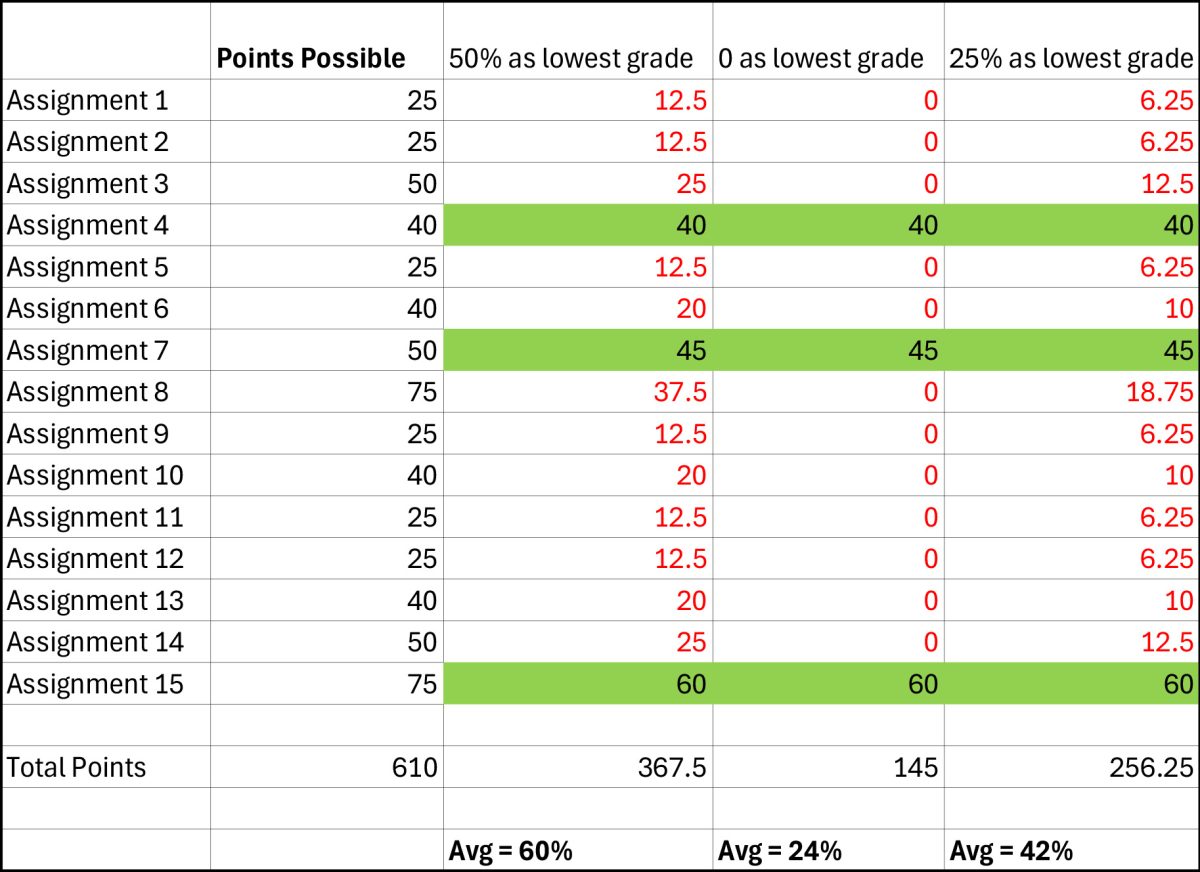
According to Lucia, one of his students realized that since they had a C average in the first semester, they could pass without doing any work during the second semester. They were demotivated from doing their classwork.
Lucia does not believe that his student is unique and there are others who are gaming the system.
…the ease by which a student can pass by not doing work for an entire semester creates a system of inequity.
— Sean Lucia
“We have a lot of students that work really really hard, and some of them even struggle to pass sometimes,” Lucia said, “and the ease by which a student can pass by not doing work for an entire semester creates a system of inequity.”
Instead of the current system, Lucia suggests that the 50% policy only be applied to finished assignments, excluding missing ones.
Other school districts have experienced similar issues. Fairfax County Public Schools, the largest school district in Virginia, previously had a 50% policy identical to ACPS, but this year, updated it to allow zeros for missing assignments.
Preparing For College
There is no difference in grading policy between regular high school level classes and AP or dual enrollment classes, meant to prepare students for college.
“It’s college level expectations in a building that’s not enforcing the skills you need to meet those expectations,” senior Shea Hale said.
It’s college level expectations in a building that’s not enforcing the skills you need to meet those expectations.
— Shea Hale
Eavan Driscoll, AHS class of ‘23 and a current student at Virginia Tech, says that college is a matter of being self-reliant, a matter that ACPS is not properly preparing its students for.
“It’s hard for teachers to have such strict deadlines and grading because so many students would be failing their classes,” Driscoll said. She said that because teachers are grading more leniently, students are under the impression that their work is up to standard, when in reality, it would not hold up in college.
Classes taken for college credit should have policies more closely aligned with that of an actual college, she said.
“I think students who need extra tries or more help should be getting that, but if you’re taking classes meant to prepare you for college, then they should look different.
It’s worth considering whether you are looking at college as a way to get educated or as a task,” Driscoll said.
Moving Forward
The pitfalls of the grading policy are exacerbated by the nationwide problem of chronic absenteeism.
Since 2019, chronic absenteeism for the division went from 9% to 18%, but failing grades only increased from 2.8% to 5.1%. Questions are being raised about why, if nearly 20% of students are chronically absent, 95% of students are passing?
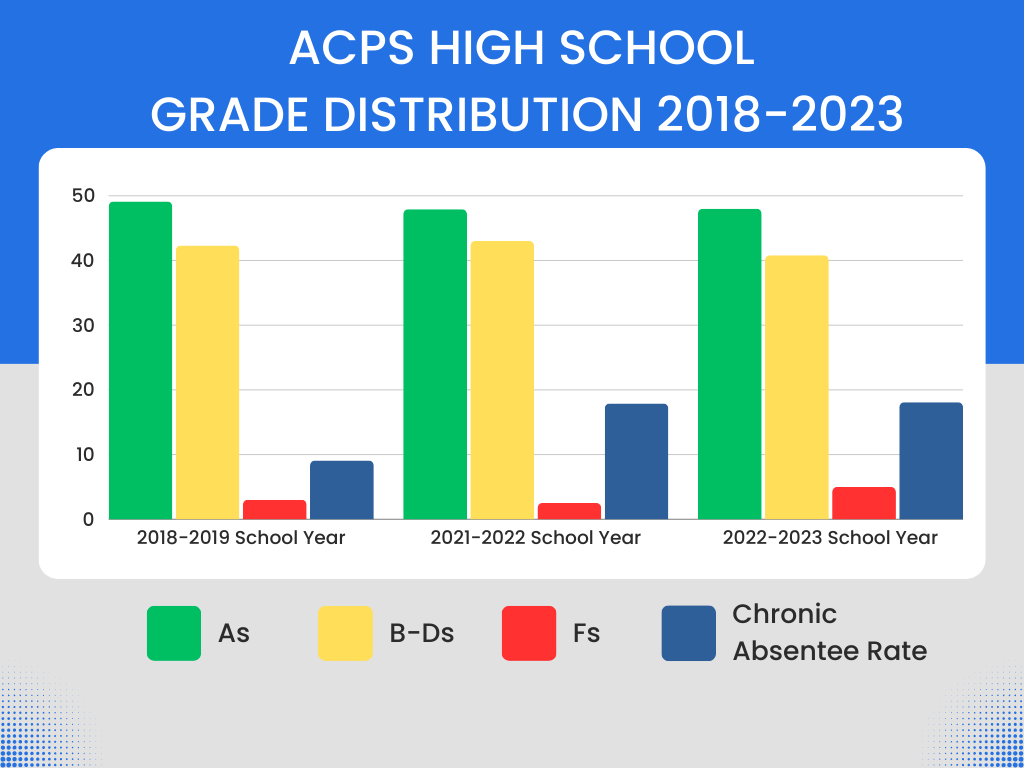
This grading policy is all the class of 2024 knows.
“I’m concerned that they are less prepared [than previous classes],” Panarese said.
Students and teachers alike are calling for ACPS to evaluate what their grading guidelines look like in practice.
“School is a constantly evolving system,” Lucia said, “so we’re never gonna get it perfect, but I would like for administration and the school system to keep working towards what’s best for students and teachers together.”
ACPS has not put forward a timeline to evaluate the effectiveness of these grading policies. The Director of Program Evaluation position is currently vacant and under a hiring freeze.

